
Thursday, December 29, 2005
Why I am Not A Cessationalist
 I am not a cessationalist (basically I believe spiritual gifts such as tongues, prophecy, and healing exist today,but are not given to everyone and no prophecy and revelation can add, subtract, or contradict scripture, See a fuller definition of what cessationism is from Wikipedia below*).
I am not a cessationalist (basically I believe spiritual gifts such as tongues, prophecy, and healing exist today,but are not given to everyone and no prophecy and revelation can add, subtract, or contradict scripture, See a fuller definition of what cessationism is from Wikipedia below*).The reason why I am not a cessationalist is because God gave me a prophecy that my good friend Pat (Yannpey) Chang would marry his fiancée, Shelley. It happened roughly 5 or 6 years ago, when all three of us had a class together (MIS 310, Management Information System). I remember that almost everyday at the beginning of class, we would see Shelley walk in, I would say verbally and nonverbally, usually with a stare, that "She's the ONE." Even though, some (including Pat) will deny my prophecy, one day we will all know the truth and it will be made known in the New Heaven and New Earth.
Well all jokes aside (I never experienced a prophetic moment), here's a helpful interview series done by Tim Challies with Dr. Sam Waldron and Dr. Wayne Grudem on the arguments between continuationism versus cessationaism.
1. Part 1 with Dr. Waldron
http://www.challies.com/archives/001511.php
2. Part 2 with Dr.Waldron
http://www.challies.com/archives/001512.php
3. Part 1 with Dr. Grudem
http://www.challies.com/archives/001518.php
4. Part 2 with Dr. Grudem
http://www.challies.com/archives/001521.php
Also, if you want more information on this matter please read
Are Miraculous Gifts for Today? (Paperback) edited by Wayne Grudem
http://www.amazon.com/gp/product/0310201551/ref=pd_bxgy_text_b/002-1161989-0441638?%5Fencoding=UTF8
*Cessationism, in Christian theology, is the view that the charismatic gifts of the Holy Spirit were for the purpose of founding and strengthening the church as it grew and expanded into the Roman Empire, thus they were in effect only during the time between the coming of the Spirit on Pentecost c. 33 AD (see Acts 2) and the fulfilment of God's purposes in history, usually identified as either the completion of the last book of the New Testament or the death of the last Apostle. This view is usually supported by reference to Ephesians 2:20 which is interpreted to read that Apostles and Prophets were only foundational to the church (and thus not continuing offices), as well as to Hebrews 2:3-4 which says miracles were performed by Apostles. Thus, with the passing of the last Apostle, miracles performed through people ceased. Some cessationists make reference to 1 Corinthians 13:8-10 as their main argument, though the majority of cessationists today do not feel that it can be used as an argument for cessationism. Cessationists also argue from the fact that since the closing of the Canon of scripture, the gifts of Prophecy and Knowledge have been rendered useless. Also supporting this view is the disputed argument that there has been no solid objective scientific reference of the working of miracles manifested within the mainstream church for the last nineteen centuries
Sunday, December 25, 2005
2005 Books of the Year
2005 Book of the Year:
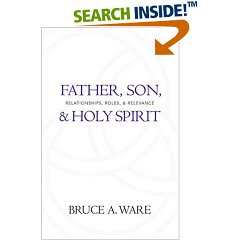
“Father, Son, & Holy Spirit: Relationships, Roles, & Relevance” by Bruce Ware
Other notable books for 2005
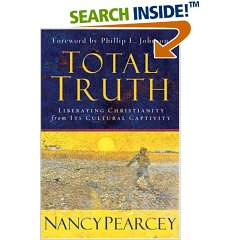
“Total Truth: Liberating Christianity from Its Cultural Captivity” by Nancy Pearcey

“The Doctrine of the Knowledge of God (Theology of Lordship)” by John Frame
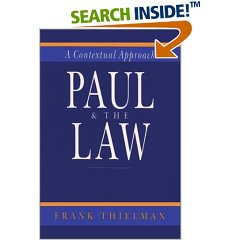
“Paul and the Law: A Contextual Approach” by Frank Thielman

“Putting Amazing Back into Grace: Embracing the Heart of the Gospel” by Michael Horton
- Great introduction to the Doctrine of Grace.
Friday, December 16, 2005
What I Want For Christmas
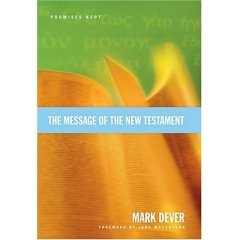
Mark Dever of 9 Marks Ministries and Capital Hill Baptist, has free mp3 files on every book of the NT (see link below). These sermons have also been edited and placed in his new book, entitled "Promised Kept: The Message of the New Testament"
http://www.capitolhillbaptist.org/partner/Article_Display_Page/0,,PTID324006CHID677216CIID2058052,00.html
Wednesday, December 14, 2005
Tuesday, December 13, 2005
Keys To Knowledge

Two doctrines that are stressed by the Reformed and Presbyterian Traditions are the doctrines of "Sola Scriptura" and "Sovereignty of God". What exactly are the doctrines of "Sola Scriptura" and "Sovereignty of God"? Below are some helpful definitions, and later I want to illustrate why I think these two doctrines are the keys to the study of knowledge (epistemology)
SOLA SCRIPTURA (Scripture Alone)
1. God, who is Himself Truth and speaks truth only, has inspired Holy Scripture in order thereby to reveal Himself to lost mankind through Jesus Christ as Creator and Lord, Redeemer and Judge. Holy Scripture is God's witness to Himself.
2. Holy Scripture, being God's own Word, written by men prepared and superintended by His Spirit, is of infallible divine authority in all matters upon which it touches: It is to be believed, as God's instruction, in all that it affirms; obeyed, as God's command, in all that it requires; embraced, as God's pledge, in all that it promises.
3. The Holy Spirit, Scripture's divine Author, both authenticates it to us by His inward witness and opens our minds to understand its meaning.
4. Being wholly and verbally God-given, Scripture is without error or fault in all its teaching, no less in what it states about God's acts in creation, about the events of world history, and about its own literary origins under God, than in its witness to God's saving grace in individual lives.
5. The authority of Scripture is inescapably impaired if this total divine inerrancy is in any way limited of disregarded, or made relative to a view of truth contrary to the Bible's own; and such lapses bring serious loss to both the individual and the Church. *
* Taken from "The Chicago Statement on Biblical Inerrancy" at http://www.spurgeon.org/~phil/creeds/chicago.htm
SOVEREIGNTY OF GOD
This simply refers to the fact that all things are under His rule and control, and that nothing happens in this Universe without His direction or permission. He is a God Who works, not just some things, but all things after the counsel of His own will (see Eph. 1:11). God's purpose is all- inclusive and is never thwarted (see Isa. 46:11). *
"It is not merely that God has the power and right to govern all things but that He does so always and without exception." - John Piper *
*Taken from Monergism.com at http://www.monergism.com/thethreshold/articles/topic/sovereignty.html
Sunday, December 11, 2005
Only If Spurgeon was a Presbyterian
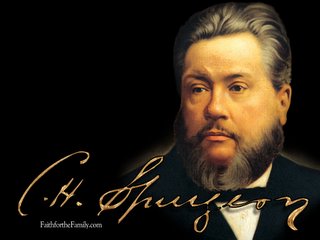
"The whole thing reminds me of the old joke told about Charles Spurgeon (by a Presbyterian). God gave so many gifts to Spurgeon that He knew we would be tempted to idolize him . . . so He made him a Baptist."
Quote from Doug Wilson blog on "N. T. Wright at Auburn 2005"
http://www.dougwils.com/index.asp?Action=Search&searchstring=Auburn+2005
For more info on Charles Spurgeon, see:
http://www.spurgeon.org/
Sunday, December 04, 2005
Al Mohler on "Courting Danger Online"
As Janet Kornblum of USA Today remarks, America's teenagers are growing up "with a mouse in one hand and a remote control in the other." The generation Microsoft founder Bill Gates calls "Generation E" has never known a time when information was not instantly accessible on the internet, or when communication was not available at warp speed through instant-messaging, e-mail, and Internet websites.
Make no mistake--teenagers are wired and highly active online. According to the Teenage Life Online report released by The Pew Internet and American Life Project, over seventeen million teenagers use the Internet. According to the report, that represents 73 percent of all teenagers. "Teenagers' use of the Internet plays a major role in their relationships with their friends, their families, and their schools," the report explains.
All this leads to new opportunities, and to new dangers. One of the latest challenges faced by parents is the development of teenage blogging. Taking advantage of Internet websites such as MySpace, Facebook, and Xanga, many teenagers and college students are creating personal blogs, which are essentially online diaries accessible to the public. As Kornblum explains, these teenagers "now pour out their hearts, minds, and angst in personal online diaries."
She also describes the problem this way: "And anyone with a connection--including would-be predators--can have a front-row view of this once-secretive teenage passion play."
Kornblum is correct. Teenagers are using blogs in unprecedented numbers. What was once communicated through phone conversations is now handled by instant-messaging. The content once secreted in the pages of hand-written diaries is now out for public consumption, and often with intimate details and personal information.
Paul Saffo of the Institute for the Future in Menlo Park, California explains, "This is the new way kids interact. Fifty years ago, they borrowed their parents' phones or made their own phones out of string and Dixie cups. Today they have their own cell phones, and they have their own computer accounts and Web pages, and they have their own blogs. It's part of life in the cyber age."
The Pew study estimates that at least four million teenagers now blog. These numbers do not even include pages found at some of the most popular Internet sites where young people are posting personal information and putting up personal Web pages.
Most observers agree that girls dominate blogging, even as in previous generations girls were far more likely than boys to keep personal diaries. Far too many parents are unaware of the dangers that lurk on the Internet.
Others are keeping a watchful eye on their children and their blogs. The Wall Street Journal recently reported that increasing numbers of parents have resorted to "spying" on their teenagers by visiting their blogs. Reporter Kevin J. Delaney took a look at this issue through the lens of one mother and her teenage daughter. This mother discovered that the daughter had lied about going to a high school football game with friends. By reading the girl's blog, this mom discovered that her daughter had actually gotten into the car of a boy the mother did not even know and had gone to an ice-cream shop without permission.
Her daughter quickly figured out that her mother had traced her activities through her online diary and blog. Since then, this mom has attempted to use software programs to snoop on her daughter's Internet use and the revelations of her personal life. According to Delaney, the mom spends approximately thirty minutes a day monitoring her daughter's activities on and off the Internet.
"If my daughter had a diary in her room, I would not read it. But what she posts on the Internet is posted to the entire world," the mother reported. Amazingly, some claim that teenagers' blogs should be off-limits to parents. As Janet Kornblum reports, "Experts are divided about whether and how parents should treat the journals--especially when it comes to teens over 13." Some argue that, since the material is published in public view, there should be no assumption of privacy. Others, Kornblum reports, "argue that reading journals is no different from eavesdropping on their kids."
This debate tells us a great deal about how American culture has shifted authority from parents to teenagers. How can a concerned and loving parent not follow their teenagers' online activities? No doubt, it's a dangerous world out there. Furthermore, Christian parents should be very suspicious about any claims to "privacy" on the part of their teenage children.
The emergence of teenage blogs has created problems, not only for parents, but for high schools and colleges. Officials at North Carolina State University brought charges against several underage students when a residential advisor found on their Facebook blogs a picture of them drinking. "There is no reasonable expectation of privacy," said Paul Cousins, director of the office of student conduct at the university. "So I have no concerns about any university becoming aware of an issue via Facebook and then following up on those concerns."
In some cases, online blogging has led to real danger. Taylor Behl, a seventeen-year-old freshman at Virginia Commonwealth University was murdered this fall. Though officials are not certain whether her online activities had any direct relation to her death, Behl had used MySpace and similar sites and had posted intimate details and personal information. Pam Lepley, a spokeswoman for the university, told reporter Alorie Gilbert of News.com, "In the course of the investigation it became very apparent to university officials just how much information she had put out about herself online. She and thousands of other people her age put out these Web pages and may not know how vulnerable it could make them." Lepley further explained, "In their own minds, they're sitting in their dorm room or at home, and they have a sense of privacy--and they really don't have it at all."
Furthermore, parents are often shocked by what they find at their kids' blogs. As one report summarizes: "Teens complain about parents and homework, using language that will make Tony Soprano blush. They share daily dramas, post songs from the latest bands, display pictures of themselves, sometimes wearing next to nothing or taking bong hits. They write angst-ridden poetry, detail supposed sexual exploits and complain about each other or offer support. But mostly they simply relay the details of their everyday lives."
Some school officials have discovered further grounds for concern. Vauhini Vara of The Wall Street Journal reports that school principals now monitor many blogs. In this report, Vara told of one sixteen-year-old girl at Paramus High School in Paramus, New Jersey who was suspended after teasing a classmate during school and implying he was homosexual. At home, even during her suspension, she posted some comments on her blog, including a post in which she heaped further scorn upon the boy. The school considered these comments to constitute harassing behavior, and the girl was suspended for three more days. The girl's parents have complained to school officials. "It's inappropriate that they're telling my daughter how to behave when she's not at school," said her father. "It was such a violation of the First Amendment." Once again, this development indicates how the pattern of authority has been radically changed. Many parents now fight for their children's "right" to harass fellow students, to criticize school officials, and to make virtually unrestricted comments online.
Christian parents must see the fallacy in this argument and the danger in forfeiting their parental responsibility. This generation of teenagers desperately needs parents who will reassert their authority and fulfill their responsibility to protect, monitor, and supervise their children.
Responsible Christian parents will establish clear boundaries and rules for their childrens' use of the Internet. There should be absolutely no expectation of privacy when it comes to what their teenagers are doing and writing on the Internet. The stakes are simply too high.
A sixteen-year-old girl in Port Washington, New York was molested by a man who had tracked her down because she had listed personal information on her MySpace profile. Many teenagers claim to understand the danger. One seventeen-year-old girl retorted, "I watch Oprah. I know what happens." Maybe so--but maybe not.
Parents would do well to limit all Internet access by teenagers. In general, teenagers are spending far too much time online and less time engaging in interaction with friends, parents, siblings, and other family members. To a great extent, the emergence of an online teen community means that teenagers now have a new and powerful mechanism for retreating into an adolescent-only world, cut off from adult contact and supervision.
This is neither healthy nor safe, and parents who neglect to protect their children online are putting their teens at risk. Teenagers with unrestricted access to the computer and the Internet are as vulnerable as adolescents who would be given an automobile with unrestricted access and virtually limitless speed. In reality, the situation is even worse, for there is no adequate police force on the Internet. It's a dangerous world out there and America's parents need to act before these dangers hit close to home.
This article is taken from http://www.crosswalk.com/news/weblogs/mohler/
Friday, December 02, 2005
The Two Headed Monster of Justification

Justification consist of two parts; 1)forgiveness of sins and 2) imputed righteousness. So when Christians by faith are declared "just/right" in God's eyes, we not only receive forgiveness from all our sins, which bring us to a "neutral" state in our relationship with God, but we receive Christ's imputed righteousness, which brings us into a "positive" state in our relationship with God, thus enabling us to inherit all the blessings which were earned by Christ's obedience.
Below is Westminster Shorter Catechism's definition of justification:
Q. 33. What is justification?A. Justification is an act of God's free grace [a], wherein he pardoneth all our sins [b], and accepteth us as righteous in his sight [c], only for the righteousness of Christ imputed to us [d], and received by faith alone [e].
[a]. Rom. 3:24
[b]. Rom. 4:6-8; IICor. 5:19
[c]. IICor. 5:21
[d]. Rom. 4:6, 11; 5:19
[e]. Gal. 2:16; Phil. 3:9
Thursday, December 01, 2005
Tuesday, November 29, 2005
Eternal Thoughts or Cheese Curds?

"Pastor John, you say that I have two possible futures in front of me: one to inherit the world, the other to inherit wrath. You know what I think? I think that tomorrow I will have some cheese curds at the State Fair. That's what I think."
*Quote from John Piper's sermon entitled "Inheriting the World Depends on Faith, Not Law"
Monday, November 28, 2005
Oaths and Slang
Oaths and Slang
by John M. Frame
"Bad Words" in The Bible
"Bathroom" and sexual slang, especially as put-downs, are related problems. One cannot make an absolute prohibition of it, for Scripture doesn't prohibit it. Indeed, one finds it in Scripture. In Phil. 3:8, Paul considers his works-righteousness to be skubala, dung. (English contains progressively stronger and more profane terms for this substance: feces, dung, cr--, sh--; probably "cr--" is the closest to skubala.) As for sexual slang as reproach, consider Galatians, where the enemies of Paul are the "tous ek peritomes," the "circumcision guys." Concerning them, Paul expresses the angry wish that they would "go all the way and castrate themselves," as one translation has it (5:12). In Phil. 3:2, he calls them "dogs" and katatome, a play on peritome, and possibly a made-up word which might be rendered in English "deconcision." (Once a critic of the Dooyeweerdian journal Philosophia Reformata wrote an article called "Philosophia Deformata." The word-play is similar.) Perhaps that term, like the language in Gal. 5:12, suggested castration to Paul.
Yet we must be aware that such instances are very unusual in scripture. They occur in cases where some kind of extreme judgment must be expressed and where there is some justified anger. And they always make a godly point.
"Bad Words" Usually Come From A Wrong Atitude
In that respect, of course, the Scriptural language is worlds apart from the street language of today, perhaps from the street language of its own time as well. We all know people who cannot utter a sentence without including a sexual or bathroom reproach, and this kind of talk has been immortalized in the current genre of ghetto-movies. The problem with that is not the utterance of a word that should be "taboo." The problem, simply, is that it shows an attitude of unmitigated contempt for others and for God's creation. It expresses an ungodly hatred for one's environment, for humans made in God's image, for God himself for putting the speaker into such circumstances (remember our connection between dishonoring God and dishonoring his creation, also implicit in the Fifth Commandment). There is here no love, joy, peace, longsuffering, gentleness, goodness, faith, meekness, self-control. There is no thankfulness. This is the "coarse" language of Eph. 5:4.
Gray-Area Involving "Bad Words"
Between the extreme of the street language and the extreme of a total abstinence from such expressions, there are lines that are hard to draw.
Problem of Contextualization
What About "Gosh, Golly, Gee?"
What of "gosh, golly, gee," etc.? Historically and etymologically, these are substitutes for the divine names, invoked to avoid the possible devastating results of "taking God's name in vain." Jesus' teaching, however, is that substituting some other expression for the divine name is to no avail, Matt. 23:16-22, cf. 5:33-37.
Still, in many subcultures, the connection between these and the divine name is not recognized, and the meaning of terms, after all, is determined by use, not etymology. Again, forbearance and flexibility are called for. I used these words while growing up in an evangelical church; all my teachers and pastors used them too. We avoided, however, profane uses of the literal divine names like the plague. Were we guilty of "substituting" something else for the divine name in order to escape God's judgment? Well, that's hard to say. Of course, the etymology is irrelevant. "Shucks" and "fiddlesticks" can also function as substitutes for the divine name. (As the outline says, all creation bears God's name.) In my early behavior there was doubtless some ambiguity, some sinful motive, as is always the case. But I don't think that on the whole we had an unworthy motive is using these terms. Generally, we used them simply to indicate surprise or to emphasize what we were saying. It is proper to use language for these purposes. I think it would be disrespectful to use the name of God, or a self-conscious substitute, for such a common purpose; but our use of those terms was not very self-conscious.
Nevertheless, when I left my boyhood church and joined the Orthodox Presbyterian Church, I discovered a very different subculture, a subculture in which the etymologies of "Gosh," etc. were taken very seriously. In that subculture, the meanings of these terms were different. And, wishing to maintain fellowship with these brothers and sisters, I soon eliminated these terms from my vocabulary. Be imitators of me! In "things indifferent" we should be as Jews among the Jews and as Gentiles among the Gentiles (I Cor. 9).
Wednesday, November 23, 2005
Beauty is Being The Image of God Part 3


Beauty Is Being In The Image of God
The unity of the good, the beautiful, the true, and the real calls us to look below the surface and to understand that the ontological (theory of existence) reality of every single human being is that we are made in the image of God. The imago Dei is the beauty in each of us, and the rest is but of cosmetic irrelevance.
Sin Makes Us Attractive to Cosmetic Irrelevance
Just as we, in our fallenness, are likely to see the fallen aspects of creation as beautiful, we are also likely to try to validate ourselves in an artificial humanism of worshiping the creature. When we look at our fellow human beings, or frankly, when we look in the mirror, we are likely to be led astray by prevailing concepts of prettiness and attractiveness rather than to gaze into the mirror or to gaze into our neighbor and see one made in the image of God. The imago Dei is the complete and transformative category here, and without it we are left with nothing but the superficial. The imago Dei explains why the child with Down's syndrome is far more beautiful in herself than the cover girl in the fashion magazine.
Tuesday, November 22, 2005
The World is Beautiful, but not Quite Part 2
Let me follow through with three basic implications of the Christian vision of truth and beauty. First, the Christian vision of beauty explains why the world is beautiful, but not quite. We are often struck by the beauty of the created order, and this feeling is validated for us in Genesis chapter 1, where the Creator's own verdict is that the creation is good. The goodness of creation is therefore nonnegotiable, and again the unity of the transcendentals reminds us that if it is good, then it is also necessarily true, and real, and beautiful. Thus our metaphysic and our aesthetic, our understanding of truth and our evaluation of ethics, all come together in creation. The creation as God made it was good and beautiful and true and real.
Our Sin Has Corrupted Beauty
But of course, we then must proceed to Genesis chapter 3, where we learn that the disruption and confusion over beauty--the corruption of the very concept of beauty--is not derived from a mere fault in human perception; it is rather a matter of human rebellion. Genesis 3 is a picture of the beautiful denied, of the real, the good, and the true rejected in favor of mankind's desire to be as God.
The cosmic effect of Adam's fall extended even to the natural world, so that what once could tell only the truth now lies.
Thus we are warned that that which is a delight to the eyes may very well be unbeautiful. Our human temptation is to substitute the truly beautiful for that which is merely a delight to our senses and a delight to our eyes, and thus we also are drawn to the forbidden fruit of a corrupt and fallen culture.
Fallen Creation Has Also Affected Beauty
All this confusion about the created world is a symptom of our fallenness, but it is not just human beings that are affected by sin, by the severing of the good, the beautiful, the true, and the real. Creation as a whole finds itself groaning because of human sin.
One Day Creation will be Restored, thus so will True Beauty
The work of redemption has cosmic significance. That which has been corrupted by sin is to be restored, but even now in this age, we are to see it and understand it as groaning, anxiously awaiting the revelation of the sons of God.
The beauty of the new Jerusalem is reflected in language about precious and semi-precious stones. The streets are said to be made of gold. All this has been turned into the stuff of gospel music, but the picture is much more of beauty than of opulence. It is meant to cause us to think about what a redeemed city would actually be, how it would appear. This is creation reset, a new heaven and a new earth, and now a new Jerusalem. Thus we have the completion of God's redeeming work, and it comes with the revelation not only of the sons of God, but of the Son of God, the Alpha and the Omega, the beginning and the end, who after all was the firstborn of all creation, the One through whom all the worlds were made, and the Logos who was the very instrument of the creation itself.
Conclusion
So the Christian worldview explains to us why the world is beautiful--but not quite. As the Psalmist says, the world indeed tells forth the glory of God, but it does so in fallenness. The world contains things of prettiness that are deadly, and the inclination of human beings is to worship the creature and the creation rather than the Creator. The world is now groaning under the effect of sin and the wrath and judgment of God. That explains a great deal to us, including natural evil--hurricanes and earthquakes and tsunamis, venomous fish and poisonous plants. Yet it was not always so, and it will not always be so. Scripture points us toward the restoration of all things. The Christian understanding of beauty is an eschatological view, one that looks forward to the unveiling of true beauty, which will come on the day of the Lord when the Alpha and the Omega will be seen as the beautiful One.
Sunday, November 20, 2005
Dr. Mohler's "A Christian Vision of Beauty" Part 1

The Theresa Interview as got me thinking about arts and what place it has in the Christian worldview, so I became pretty excited to come across Al Mohler's commentary on " A Christian Vision of Beauty" , a sermon he preached at Capital Hill Baptist.
You can find the sermon here:
http://www.capitolhillbaptist.org/
And you can find the written sermon here:
http://www.crosswalk.com/news/weblogs/mohler/
If don't have time to read or listen to it all and please read my INADEQUATE summary of Dr. Mohler's sermon. Since the sermon is pretty long I'll divide into 3 parts.
A Christian Vision of Beauty Part 1
Question of Beauty in the Church
But if beauty is in crisis in terms of the culture, both at the popular level and among the elites, it is also in trouble in the church, where the influence of popular culture has led to confusion about what beauty actually is and why we as Christians should seek it.
Christian Beauty is Simunltaneoulsy "The Good, The Truth and The Real"
A Christian understanding of beauty runs directly into the wisdom of the age by suggesting that the beautiful is simultaneously the good and the true and the real. This goes all the way back to the conversation of the ancients--especially to Plato, who understood the good, the beautiful, the true, and the real as being essentially reducible to the same thing. If there is one good, then that good must also be the true, which must also be the real, which must also be the beautiful. So the good, the beautiful, the true, and the real--the four great historical transcendentals--are unified in the One. For Plato, however, the One had no name.
Christian Beauty (The Good, The Truth, and The Real) are Established in the Trinity
Augustine, the great theologian of the patristic era, identified the One as the one true and living God. Taking Plato's metaphysical speculations into the very heart of the Gospel, Augustine suggested that Christians uniquely understand that the good, the beautiful, the true, and the real, are indeed one, because they are established in the reality of the self-revealing God--the triune God of Father, Son, and Holy Spirit. He alone is beautiful, He alone is good, He alone is true, and He alone is real. That is not to suggest that nothing else reflects beauty or truth or goodness. It is simply to say that He alone, by virtue of the fact that He is infinite in all His perfections, is the source and the judge and the end of all that is good, beautiful, true, and real. For as Paul said, from Him and through Him and to Him are all things, to whom be glory forever, Amen.
Christian Beauty Has a Moral Context and Truth Context
Now this Christian conversation about the transcendentals opens an entirely new awareness for us. We now begin to understand that there is a moral context, a truth context, to every question about beauty. We can no longer talk about beauty as a mere matter of taste. Instantly, by affirming the unity of the transcendentals, we are required to see beauty fundamentally as a matter of truth to which taste is accountable, rather than a matter of taste to which truth is accountable.
Thus, it violates Scripture and indeed the character of God to call something "beautiful" which is not good, or "true" which is not beautiful, or "real" which is not true. Now, all of these things come together and immediately are subjective analyses of the beautiful. Yet if we are honest, we admit to ourselves that in our common cultural conversation, we routinely sever the good from the true, the true from the beautiful, the beautiful from the real, and the real from the good. As Christians, we alone really understand why this is so, and why it so important.
True Beauty Is Found in God
Al Mohler Quotes St. Augustine and Jonthan Edwards:
Augustine continues: "It was you then, O Lord, who made them. You who are beautiful, for they too are beautiful. You who are good, for they too are good. You who are, for they too are. But they are not beautiful and good as you are beautiful and good. Nor do they have their being as you the Creator have your being. In comparison with you, they have neither beauty nor goodness nor being at all." Augustine realizes that in order to see true beauty, he has to go to his Creator, and then, knowing the Creator, he may observe the creation and see that it does indeed bear the mark of its Maker.
The same theme was picked up by Jonathan Edwards, who said this: "True holiness must mainly consist in love to God, for holiness consists in loving what is most excellent and beautiful. Because God is infinitely the most beautiful and excellent being, He must necessarily be loved supremely by those who are truly holy. It follows from this that God's own holiness must consist primarily in love to Himself. Being most holy, He most loves what is good and beautiful, that is Himself. To love completely what is most completely good is to be most completely perfect. From this, it follows that a truly holy mind, above all other things, seeks the glory of God and makes the glory of God His supreme governing and ultimate end."
True Beauty is in A Crisis due to Sin
When we look at the unity of the transcendentals, and compare Edwards' and Augustine's vision of view to our contemporary poverty concerning things beautiful, we are quickly and painfully aware that something has gone horribly wrong. Why would human beings seek to sunder the unity between the good and the beautiful, between the true and the real, between the beautiful and the true? Why would we want to call something that is ugly true? Why would we want to call something that is unreal beautiful? That is a symptom of a human sickness, and that sickness is sin.
Our understanding of beauty as a category in crisis begins not with contemporary confusion, but in the Garden of Eden, where our first parents were attracted to the forbidden fruit at least in part because it was attractive to the eyes. A false understanding of beauty--the false allure of the evil rather than the good--is a part of the story of the Fall. Thus the confusion over beauty is not merely an item of cultural consternation, nor is it merely a matter of theological debate. It is a matter of redemption. The only way out of our confusion over beauty is to know the Creator, to know Him not merely conceptually but personally, and to have our relationship with Him once again set right, something which only He can do. Then Edwards' vision of the "sweet mutual consents" might be realized--a redeemed people once again entering into the mutual consent of the good, the beautiful, the true, and the real.
The Theresa Interview Part 2
10. Everyone that knows you, knows that you are a creative and exceptional artist. What place does art, namely visual arts such as painting and drawing, have in the Christian life and church?
- Visual arts have always been a big part of the Christian life, ever since the Creation! Our God is creative, imaginative, and artistic. And for centuries, art has been used to depict images of the gospel story. I remember traveling to Florence, Italy, and seeing all sorts of architecture with Christian themes. Back in the day, Christians used relief sculptures on church doors to tell the story of Christ because many people were illiterate and therefore, unable to read the Scriptures for themselves. Many of the old cathedrals have murals on ceilings and walls that reflect the beauty and glory of God. Nowadays, people commonly use visual arts, like painting and drawing, to express feelings and emotions. Since the Christian life is about combining “head” knowledge with “heart” knowledge….visual arts can be a big part of communicating the “heart”. (Sorry, I didn’t mean for that to rhyme!)
11. Do you think that the area of art has been neglected by the church? If so, how would you address the issue?
- In my opinion, I have seen some churches really use art well for their ministries and even as worship to the Lord. Many churches and organizations have combined design with technology – which captures wide audiences for the Lord. Examples: Liquid, ministry of Austin Chinese Church (www.liquid-acc.com), Ecclesia in Houston (www.ecclesiahouston.org), Youth Specialties (www.youthspecialties.com). The only concern I have is if church becomes over commercialized due to reliance on visual designs.
12. What is the definition of good art? And does it have to have an explicit "Christian message", such as having a big cross on everything you paint or draw?
- Of course, people are always going to be judgmental when it comes to art – there are certain things that some people find easier-to-look-at and some things that are just plain "ugly". It's always hard to say whether a piece of art is good or bad – it depends who’s viewing it. Either way, I believe that God will be glorified as long as "whatever you do, work at it with all your heart, as working for the Lord, and not for men..." (Col 3:23). If your artwork is done to bless the Lord and not for personal glory or for others, then "you will receive an inheritance from the Lord as a reward (v. 24)" because it is "good" to Him. That being said, it doesn’t have to have a big cross, or Jesus’ face, or bright white glowing light in order to be have a Christian theme. A biblical concept can be abstractly illustrated or referenced – doesn’t have to be “in-your-face”. However, I have been impressed and seen God work through a particular artist who is dubbed as “the Jesus painter”, Mike Lewis. He paints large portrait canvases of Jesus and parts of His ministry. Check out his website – www.jesuspainter.com.
13. In your life, how have you used art to glorify God?
- Having recognized that God has blessed me with a love for art and aesthetically-pleasing things, I try to use it to bless others and Him in return. For example, I really enjoy making gifts for friends. I've noticed that some of their most favorite things I've given them are not generic store-bought items, but instead are the unique hand-made ones. So, I spend a lot of my free time thinking of ways I can encourage my friends with creative presents - whether it's by sewing a pillow, painting a picture, or designing a card. Also, I love decorating and using my living space to display artwork or things that reflect the beauty and glory of God. My husband and I just moved to Vancouver, Canada, and we're living in a basement suite. There is so much room for me to decorate. I am currently brainstorming ways to use the walls as a "gallery" for paintings and other creations. Lastly, I think it glorifies God when we notice and talk about His creation! Remembering that God himself is an artist helps us to view the world with wide eyes. As an elementary art teacher, I would talk with the kids about what they see in nature and how we could create things to reflect the beautiful colors/patterns/textures found in this world.
Saturday, November 19, 2005
Puppies Galore
Brain Evaluation

Justin Taylor and The Emerging Church
I would also like to highly recommend reading Justin Taylor's blog daily, that is if you could read one blog each day, you would read his. There's no one who provides better resources on all issues of life and is more charitable then Justin.
The link is:
http://theologica.blogspot.com/
Wednesday, November 16, 2005
The Theresa Interview

Who's Theresa Tarn???
When I think of "peanut butter", I think of "jelly", like wise, when I think of "Mike Chiu", the image of kites come to my mind. Part of being human is having the propensity to associate and link things with other things. So when I think of Theresa Tarn (formerly Fong), I think of my lovely fiancée, Julia. In fact, ever since I have known Julia (about 8 years) I have known Theresa, who has been and continues to be a big part in shaping and supporting my fiancée, for that I will always be indebted.
Beside being an integral part of my life through her friendship with Julia, Theresa has encouraged me in many more direct ways, such as her letter/birthday notes in college, helping out with the "Wheel of Death" and other games for my retreat, and drawing me this really cool and realistic "Michael Jordan" picture our sophomore year.
Speaking of word association, many would link "Theresa" rightly with the words "creative" or "artist". Ever since I have known Theresa, she has displayed a level of creativity and beauty in the field of "arts" that point to the glory of our creator. So for this interview, I was eager to get her view of the "arts" in the Christian life, which I think you will find helpful.
So I hope this interview with Theresa will encourage you for the glory of God,
Dan
Tuesday, November 15, 2005
The Theresa Interview Part 1:
1. Tell us briefly about your background, especially as it relates to God and Christ?- In high school, I attended church on-and-off with my family but was extremely unaware of reasons behind going. I mainly went to church to feel good about myself, trying to obtain a long "streak" of attendance. I remember being proud of myself for going eight times in a row. It was all "head-knowledge", if anything. After high school, I started wondering exactly why this man named Jesus had to die on the cross for me. In college, I began questioning and exploring the purpose of life. Eventually, a friend invited me Chinese Bible Study, where I met other believers and was told how to have a relationship with God. This blew me away - since I never heard the concept of GOD wanting a relationship with ME. I became a Christian in the spring of 1998, and started learning how to worship God with my life. Since then, my knowledge of God has become "heart-knowledge" instead of mere facts.
2. What are you currently doing now?- I've put aside my art-teaching job for the moment, working part-time to support Jason (husband) in seminary.
3. What type of Christian ministry are you involved in?- Working in the office of a graduate theological school in Vancouver,Canada (Carey Theological College).
4. What do you find to be the hardest part of your ministry?- It's hard to meet non-Christians. Since I'm surrounded by big-time theological professors and novelists, seminarian students, etc., I find it hard to make non-Christian relationships.
5. What advice would you give a young person in discerning God's direction for them in their future occupation and ministry?- I'm not even sure! But what I CAN say is that when the Lord opens apath for you, you should take it. I've seen instances in my so-called career and Jason's where God has definitely opened opportunities, we followed...and so far it's been good.
6. What people have influence you the most in your Christian life?- Leslie Mei, discipler and friend- Sandy Lu, questioner and friend- Julia Chen, encourager and friend- Jason Tarn, husband and friend
7. What are 5 essential books you would recommend, besides the Bible?- "Through Gates of Splendor" by Elisabeth Elliott, followed by the documentary film "Beyond the Gates of Splendor" (2004): awesomebiography/story of missionaries- "Let the Nations Be Glad" by John Piper: great perspective on missions- "Fresh Wind, Fresh Fire" by Bill Hybels: easy read on how a church can grow through prayer- "Mission: Africa" or "The aWAKE Project" or"www.oneliferevolution.org": anything that makes you aware of the AIDS crisis in Africa- "The Little Prince" by Antoine de Saint-Exupéry: light and fun kid's book, it's dreamy!
8. What advice would you give a young Christian, as he or she walks with God?- Read the Word of God, "meditate on it day and night, so that you maybe careful to do everything written in it (Joshua 1:8)- Pray for others as much as you can- Share and talk with others about what God is doing in your life
9. What are some of your hobbies?- Art/Painting/Drawing/Decorating- Singing/Listening to music- Sleeping
Monday, November 14, 2005
Kunalians' Interview Series

In a couple of days, I will be introducing the "Kunalians' Interview Series", which will consist of me interviewing people on various issues relating to the Christian life. I hope the series will be one of God's means of grace to help us fight the good fight, taking hold of eternal life.
" 12Fight the good fight of the faith. Take hold of the eternal life to which you were called and about which you made the good confession in the presence of many witnesses." - 1 Timothy 6:12
Tuesday, November 08, 2005
Types of Certainty Part 4

Moral Certainty = Reasonable
“The third variety of certainty may be termed moral certainty of juridical certainty. This is the certainty of the law courts when they use the expression “beyond reasonable doubt”. -pg.105
An Evaluation of Moral Certainty
Dr. Sproul evaluates the principle of moral certainty through an illustration of a court case.
“Supposing we have a case of person who committed cold-blooded murder in the presence of five hundred witness and whose ruthless act was captured by a broad-cast television camera. To compound the evidence, the culprit was arrested while holding a smoking gun, which fired the fatal bullet and which clearly bears his fingerprints.”- pg. 105
Can the Defense Attorney Demand Absolute Certainty?
“Suppose now that the defense attorney for the accused seeks exoneration on the basis of an appeal to the lack of absolute certainty concerning the guilt of his client. He argues that 1) the five hundred witnesses suffered a mass hallucination; 2) the television account was a carefully contrived…etc” –pg 105
“Thus the defense rests its case on a philosophical appeal to the theoretical possibility that his client is a victim of strange and extraordinary circumstances”-pg 105
Dr. Sproul then states that because“the circumstantial evidence amassed by the prosecution is presented as being less than absolutely certain so that the defense asks for acquittal on the basis of “reasonable doubt”.- pg 105
Rational versus Reasonable
“How do we respond to such a bizarre scenario? The doubt raised by the defense may indeed be rational, but is it reasonable? The courts recognize the difference. Without a distinction between formal certainty and moral or juridical certainty, it would be impossible to convict anyone of a crime unless God himself were both prosecutor and judge” –pg 106
Conclusion
The certainty of God and anything else should be based on reasonable evidence. Dr. Sproul states (in regards to moral certainty of the authority of scripture):
“Thus moral certainty refers to certainty acquired from the weight of evidence that, though lacking philosophical certainty, is weighty enough to impose moral culpability. It is precisely this kind of certainty that the indicia of Scripture yield” – pg. 106
Monday, November 07, 2005
Types of Certainty Part 3
The second type of certainty is not absolute but one that describes a sense of confidence. Dr. Sproul states:
“Obviously when we speak of being “sure” of things or say “certainly,” we are speaking about a kind of certainty that is not the same as a technical philosophical certainty. Here we are using the word certain in a way that describes a particular feeling state that attends a given idea or assertion. Here the word certain describes a sense of confidence or assurance. Such a certainty can manifest relative degrees of intensity, since it is more or less subjected to a mixture of doubt.” –pg 104
Wicked


Usually I don't really enjoy going to musicals. The biggest problem I have with musicals, is that they sing and dance way too much... why must they sing and dance around all the time....can't the actor or actress just say what's on their minds, like in real life.
So last night as Julia and I went to go watch "Wicked", a play retelling the famous story, The Wizard of Oz (see http://www.wickedthemusical.com ), I was expecting the worst. But to my surpise it was really good. Wicked was kinda like Dirk from the Dallas Mavs and Daniel from the "Karate Kid" series, they all appeared from the outside to suck but once they start to do their thing...you start to realize that they are pretty good.
Sunday, November 06, 2005
Killer Kunalians

Someone made a dumb comment (See comments NBA Predictions 05-06) about me not knowing anything about basketball. Below is the current rankings for my fantasy baskeball league, and as you can see Killer Kunalians are number 1!!!!!! By the way, Geoff (Louisville Sluggards) is number 11.
1. Killer Kunalians
2. Quires Mas Tres
3. Austin Toros
4. Goodfellas
5. The Mookie Blaylocks
6. dialectical geniuses
7. team benzo
8. ALIEF
10. Craphonso Thorpe
11. Louisville Sluggers
12. Dallas Darkhorse
Sunday School For Nov. 13th
Sunday, October 30, 2005
Types of Certainty Part 2

In his book, Dr. Sproul list 3 different type of certainty,
1. Philosophical/Formal Certainty
2. Confidence
3. Moral Certainty
Today we will deal with the first.
Definition of Philosophical Certainty
“Philosophical certainty has to with formal arguments that are so logically tight and compelling that to deny the conclusion would be to yield to manifest irrationality or absurdity. This kind of certainty can be found only within the framework of the formal relationship of propositions.” –pg 102
Example of Philosophical Certainty
Dr. Sproul presents an example of philosophical certainty with a syllogism, which is a form of deductive reasoning consisting of a major premise, a minor premise, and a conclusion.
A syllogism:
Premise A: All men are mortal.
Premise B: Socrates is a man.
Premise C: Socrates is mortal.
“ If this syllogism the canons of logic dictates that if premise A is true and premise B is true, then the conclusion is necessarily, by resistless logic, true. Note, however, that the truth of the conclusion, though it flows irresistible from the premises, is still ultimately dependent on the truth of the premises.” –pg.102
Absolute Philosophical Certainty
Dr. Sproul then evaluates the idea if we can know anything with ABSOLUTE certainty by evaluating both premises.
First Dr. Sproul evaluates premise A by asking the question “do we know with ABSOLUTE certainty that Socrates was in fact mortal?”.
“Do we know with certainty that all men are mortal? If so, how do we know it? By reason? By sense perception? Could we possibly prove this statement to be true? To prove it absolutely we would have to examine every human being who has ever lived and is now alive to prove our claim…To know inductively that all men are mortal we would have to observe the death of all men, including ourselves! The only way we could have absolute that all men are mortal would be posthumously!” –pg.103
Dr. Sproul also evaluates the second premise, noting that this also lacks ABSOLUTE certainty.
“What about premise B?…We trust the reports of fallible men of antiquity for our information about Socrates. We have a high degree of probability that there was a Socrates but we lack absolute certainty.”-pg. 103
Only God has Absolute Philosophical Certainty
“As long as our capacity for knowledge is the slightest bit less than omniscient, then the problem of philosophical certainty will remain. Only a being who is omniscient can transcend the problem. In other words, only God can have philosophical certainty. Since we are not and cannot be gods, we are lift with philosophical uncertainty."-pg.104
Conclusion
Don’t ever allow anyone to require ABSOLUTE certainty for why you believe in God, or in anything else for that matter.
Types of Certainty Part 1

What type or kind of certainty must we have about God, His existence, the inerrancy of the Bible, and the revelation about Christ? Sometimes I think that some people demand a type of certainty that is unreasonable and one that they don’t personally require for anything else in life.
In the following days, I want to present some excerpts from R.C. Sproul’s book entitled “Scripture Alone: The Evangelical Doctrine”, where he deals with the meaning of “certainty”.
NBA 05-06 Predications:

NBA 05-06 Predications:
Southwest: 1. Spurs 2. Rockets 3. Mavs. 5. Grizzlies 6. Hornets.
Northwest: 1. Nuggets 2. KG* 3. Seattle 4. Jazz 5. Blazers.
Pacific: 1. Kings 2. Suns. 3. Lakers 4. Warriors 5. Clippers.
Atlantic: 1. Nets 2. Celtics 3. 76ers 4. Knicks 5. Raptors
Central: 1. Pistons 2. Pacers 3. Cavaliers 4. Bulls. 5. Bucks.
Southeast: 1. Heat 2. Wizards 3. Magic 4. Bobcats. 5. Hawks
NBA Finals: Heat over Rockets
MVP: T-MAC
Rookie of the Year: Deron Williams (Utah Jazz)
Players to Watch: JR Smith (Hornets), Nate Robinson (Knicks), Larry Hughes (Cavs), and TJ Ford (Bucks)
Danny's Bday Poem

It’s Danny’s Bday,
Everybody say “YEAH!!!”
Danny was born on Halloween
A day when he can dress like someone mean,
Or like someone on the Dallas Cowboys team.
It’s Danny’s Bday,
Everybody say, “YEAH”.
Danny was born with fat cheeks,
Like someone, who ate and drank all week,
Which is phatter than the skills of Chris Leak.

It’s Danny’s Bday,
Everybody say, “YEAH!!”
Danny was born without a mate,

But it’s not too late,
For his birthday, who will be his date?
What's On Tap

Desiring God Radio - There's a series on Ruth entitled, “Ruth: Sweet and Bitter Providence”.
http://www.desiringgodradio.org/content/index.php
Renewing Your Mind – Dr. Sproul is doing a series on the book of Hebrews.
http://www.ligonier.org/radio/index.php
Grace to You – Dr. MacArthur is doing a series called “ A Plea for Purity”
http://www.ligonier.org/radio/index.php
White Horse Inn – Dr. Horton and the guys are doing a series called ”Is the Reformation Over?” with special guest Mark Noll, the historian.
http://www.whitehorseinn.org/
Al Mohler Show had some interesting topics last week including, “How Do Christians Deal With Halloween?”
http://www.albertmohler.com/radio_list.php
Friday, October 28, 2005
Fall Short of the Glory of God

Last Sunday School, I don't think I was too clear on describing the phase "fall short of the glory of God" in Romans 3:23. My friend ,Geoff, on his blog has written a short article entitled "Beauty in God's eye", which may help.
Check it out here:
http://groundtoglory.blogspot.com/
Thursday, October 27, 2005
Why Judges Make Law: The Roots and Remedy of Judicial Imperialism

Nancy Pearcy, author of Total Truth, is quickly becoming one of my favorite writers. Below is my summary/outline of her article called “Why Judges Makes Law: The Roots and Remedy of Judicial Imperialism”, which deals with the problem of the judicial system interpreting and making new laws.
The entire article can be found at: http://www.pearceyreport.com/archives/2005/09/post_2.php
1. The Problem: "Whether Judges should interpret the law or make new law"?
“There is a delicious irony about the Supreme Court's taking up a case that involves one of the most contentious legal issues of our time: whether judges should interpret the law or make new law.”
2. History of Judicial Usurpation
"(Prior to 1800) The concept of obligation was thought to derive from the inherent rightness or justice of the law, and the role of judges was not to make law but only to discover and apply pre-existing rules."
"By 1800, however, these classic concepts of law had been largely abandoned. To accord with a political system of popular sovereignty, law was redefined as based on will of the people. Popular consent was extended from the political sphere to the legal sphere. Yet the idea that law is an instrument of will was a two-edged sword, for it also meant that law could be shaped by the will of the judge intent on molding legal doctrine according to public policy goals."
3. This Approach to the law was influenced by the Pragmatic Philosophy which is rooted in Darwinism
"This approach to the law received its most influential philosophical justification in the writings of Oliver Wendell Holmes, Jr., an important founder of a school of thought known as legal pragmatism. Legal pragmatism traces its origins to the early decades of the 20th Century when America was wrestling with the implications of Darwin's theory of evolution. Holmes was one of a group of scholars whose goal was to work out the implications of Darwinism for an overarching philosophy of life, which came to be called pragmatism."
"The development of American legal philosophy underscores the crucial role played by the Darwinian view of origins in every area of thought. Darwinism is not only a biological theory; it is also the basis for a comprehensive worldview--implying a new philosophy of mind, knowledge, morality and law. In modern society, science is given authority to tell us "what really is," with the result that philosophy and the humanities adapt to its vision of reality. Thus a direct line connects Darwinism to both the postmodernism of Richard Rorty and the pragmatic moral skepticism of Richard Posner. In these philosophies, the only objective and absolute truth is that there are no objective and absolute truths. In essence, the death of God substitutes for the existence of God, in the sense that it functions as the one fundamental truth that cannot be doubted"
4. Is the Law Only a Product of Cultural Evolution?
"In his highly influential 1897 essay "The Path of the Law," Holmes even reduced law to a summary of the social and economic policies shown scientifically to work best. As he put it, "The man of the future is the man of statistics and the master of economics." Law was redefined as a tool for identifying and manipulating factors aimed at creating social harmony and progress."
"In short, law was little more than a tool for social engineering, using the coercive power of the state to enforce the policies deemed by bureaucrats to be most desirable. To quote Holmes again, the justification for a law is not that it is consistent with universal principles but "that it helps bring out a social end which we desire."
"In short, for Holmes law is not based on any eternal or divine moral law; it is strictly a product of cultural evolution, and it functions as an instrument of social policy".
5. Pragmatism leads to the Separation of Morality (And God) From Law
"Pearcy quotes Richard Posner (a neopragmatists), "The only warrant for believing that there is a moral law that is 'out there' in the very strong sense claimed by a Plato or an Aquinas," Posner says, "is a certain type of religious faith, the faith in a Supreme Lawgiver and in a spiritual reality as real as a material reality." But this position Posner excludes by definition, without any argument, from academic discourse: "religious arguments are not a part of academic moralism." In a recent essay, he writes that a pragmatist judge facing a new situation for which there is no clear legal precedent "does not look to God or other transcendental sources of moral principle." For Posner, the only sound basis for a legal rule is social advantage;"
"The chief theoretical failing of pragmatism is that its only measure for evaluating law is whether it "works"--whether it achieves desired social goals: It offers no transcendent principles by which to say whether those goals themselves are good or bad. "
6. The Battle Against Darwinism is the key in Defeating Judicial Imperialism
"Thus if conservatives want to make a thorough-going critique of what Kristol and Bell denounce as "judicial supremacy," we must begin with Darwinism as a scientific theory. Philosophical and moral critiques of pragmatism have been offered by several philosophers, from Bertrand Russell to Ronald Dworkin. But such critiques will remain ineffective if Darwin described what is in fact the case in nature: If natural forces alone produced the human mind, for example, then we must accept the naturalistic and reductionist conclusion that the mind is merely a tool adapted for survival--along with the relativistic and skeptical implications this has for morality and law. Thus we need to be prepared to take the intellectual battle into science itself. The controversy over Darwin versus design is not a peripheral issue but lies at the heart of the cultural crisis of our day."



















